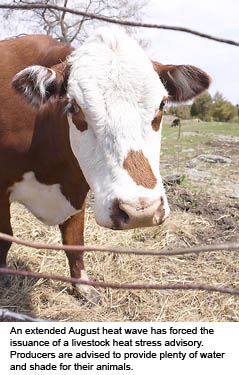Hazardous Heat Wave Sweeping the State
Hazardous Heat Wave Sweeping the State

Kentucky livestock producers will need to keep an attentive eye on their animals for the next eight to 14 days, as the hottest spell of weather since August 2005 continues to sweep across the state.
University of Kentucky Agricultural Meteorologist Tom Priddy has issued a livestock heat stress advisory for the entire state. Heat indices in the afternoon and early evening are expected to be in the 100 to 105 degree range, with the northern counties experiencing indices that could be closer to 110 degrees. The livestock heat index is in the emergency category and will continue to be so for the foreseeable future.
Priddy said the heat wave prompts some real concern for humans, as well as livestock and pets. The heat index is a combination of air temperature and humidity. That one-two punch makes it hazardous for people and animals. Dew points above 65 degrees lead officials to declare conditions dangerous for livestock, he said. Dew points around the state continue to hover in the 70s and Priddy expects very little change in the extended forecast.
“There will be a slight break over the weekend when temperatures drop to the high 80s and low 90s across the state,” he said, “but then it picks right back up again at the beginning of next week.”
UK College of Agriculture livestock specialist Bill Crist recommends providing plenty of fresh water, adequate feed and shade for livestock. He said the most important things producers can do are to provide cool, clean water and shade with buildings as open as possible.
“Also, adding fans inside the buildings can help keep air flowing,” he said. “When you bring the cows into the milking parlor, don’t move them fast and try to keep them calm.”
Some dairy producers have installed sprinkler systems that spray cool water for a few minutes at a time. When the sprinklers shut off the fans evaporate water and draw heat from the cows.
All species of livestock will benefit from early morning or evening feeding times to avoid eating in the hottest parts of the day, he said.
Crist said it’s important for producers to avoid stressing the animals in hot weather. This means to limit traveling or even movement around the farm, as well as working them in any way. This can all put the animals under added stress and cause more problems down the road, he said.
“Certainly, you do not want to work cattle with this kind of weather – veterinarian work, reproductive checks or vaccinations … anything that makes them move for some reason,” he said.
Up-to-date livestock heat stress index information is available through the Agricultural Weather Center Web site at http://wwwagwx.ca.uky.edu/ or by going to the local county Extension office’s Web site and clicking on the weather link.